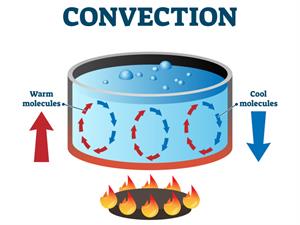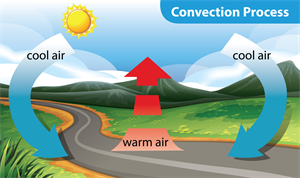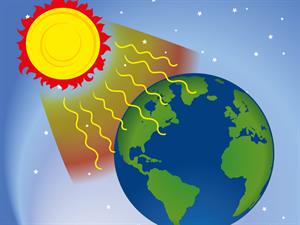
PUMPA - SMART LEARNING
எங்கள் ஆசிரியர்களுடன் 1-ஆன்-1 ஆலோசனை நேரத்தைப் பெறுங்கள். டாப்பர் ஆவதற்கு நாங்கள் பயிற்சி அளிப்போம்
Book Free DemoConvection:
When we heat the water in the vessel, water molecules at the bottom receive heat energy and move upward. Then the molecules at the top come down and get heated. This mode of heat transfer is known as convection. Air in the atmosphere also follows the same principle while heating. Thus, the form of heat transfer from higher temperature regions to lower temperature regions by the actual movement of molecules is known as convection. Convection takes place in liquids and gases.
Convection is the movement of fluid (liquid and gas) molecules from higher temperature regions to lower temperature regions.

Convection

Convection Process
Example:
The following are some examples of convection in daily life.
- Boiling of water - the molecules with the higher density move at the bottom (Coldwater). In contrast, the less dense molecules (Hot water) move upwards, resulting in the circular motion of the molecules so that water gets heated.
- The formation of the land and sea breeze is due to the convection of air.
- Wind flows from one region to another by convection.
- In warm-blooded animals, blood circulation takes place with the help of convection, and it helps maintain the body temperature.
- In hot air balloons, heat is transferred by convection, and so the balloon raises.
- In refrigerators, cool air moves downwards and replaces the hot air because of convection.
Radiation:
By conduction, heat is transferred through solids, and by convection, heat is transferred through liquids and gases, but by radiation, heat can be transferred through empty space even through the vacuum. Heat energy from the Sun reaches the Earth by this form of heat transfer.
Radiation is defined as the mode of heat transfer from one place to another in the form of electromagnetic waves.

Example:
The following are some examples of radiation in daily life.
- Heat energy from the Sun reaches the Earth by radiation.
- While standing near the fire, we feel the heat which is transferred as radiation.
- Black surfaces absorb heat radiation. So that the bottom of the cooking vessels are painted black.
- The white colour reflects heat radiation. That is why we are advised to wear white clothes during summer.
Note: Heat transfer by radiation is visible to our eyes. When a substance is heated to \(500\)\(°C\), the radiation becomes visible as a dull red glow, and the skin senses the warmth. Further heating rapidly increases radiation, and its perceived colour becomes orange, yellow and finally white.